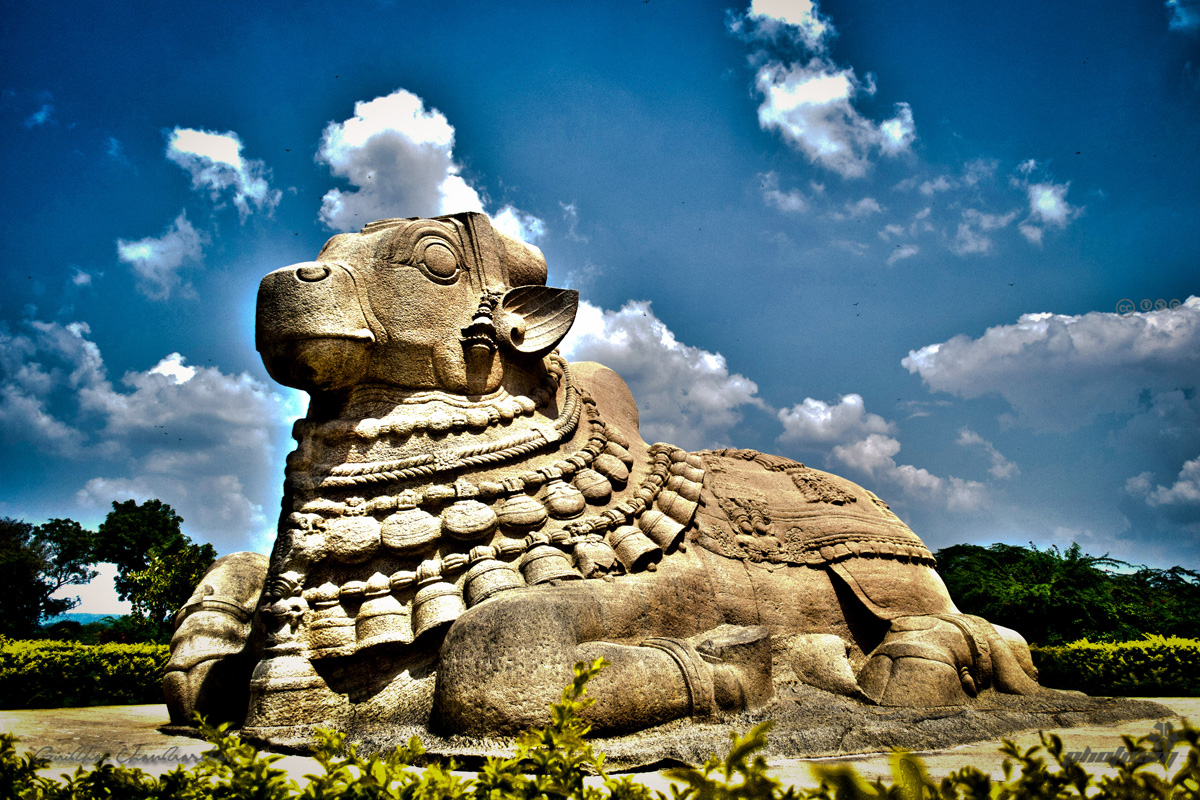Here are excerpts, Sanskrit version of Hari Vamsa purana
tato madhye divyashabdaH prAdurAsInmahIpate |
R^iShINAM brahmaputrANAM mahatAmapi bhArata ||3-133-62
sa eSha sha~NkarasyAgre ratho bhUmiM pratiShThitaH |
ajeyo jayyatAM prAptaH sarvalokasya pashyataH ||3-133-63
O king! As Shiva was thus fighting the tripurAsuras, a loud noise came from the sky. In front of Maharishis, who are sons of Brahma, and Shankara, the chariot fell to the ground. In this manner, Lord Shiva, who is known to be undefeatable, was defeated in front of the whole universe to see.
tasminnipatite rAjanrathAnAM pravare rathe |
nipetuH sarvabhUtAni bhUtale vasudhAdhipa ||3-133-64
vicheluH parvatAgrANi chelushchaiva mahAdrumAH |
vichukShubhuH samudrAshcha na rejushcha disho dasha ||3-133-65
Along with that best chariot of chariots, all the living entities fell down to the earth. Due to the impact of this fall, even great mountains and biggest of trees swayed; oceans got agitated; and there was no light in the horizons of any of the ten directions.
vR^iddhAshcha brAhmaNAstatra jepushcha paramaM japam |
yattadbrahmamayaM tejaH sarvatra vijayaiShiNAm ||3-133-66
shAntyarthaM sarvabhUtAnAmiha loke paratra cha |
samAdhAyAtmanA.a.atmAnaM yogaprAptena hetunA ||3-133-67
rathantareNa sAmnAtha brahmabhUtena bhArata |
tejasA jvalayanviShNostryakShasya cha mahAtmanaH ||3-133-68
sarveShAM chaiva devAnAM balinAM kAmarUpiNAm |
R^iShINAM tapasA.a.aDhyAnAM vasatAM vijane vane ||3-133-69
Mature (in knowledge, conduct, austerity, and splendor) brAhmaNas, at this juncture, performed a great japa, directed towards tEjas, which is of the form of brahmam. They, wishing victory (for the Devas), and wishing tranquility for all beings in this world and the next, with their yogic prowess and in their minds, worshiped the Supreme. (As a result of such worship), they - the wishful Devas, and the Rishis who perform austerities in secluded forests - made the divine tEjas of Vishnu shine inside the powerful three-eyed lord.
atha viShNurmahAyogI sarvatodR^ishya tattvataH |
vR^iSharUpaM samAsthAya projjahAra rathottamam||3-133-70
samAkrAntaM devagaNaiH samagrabalapauruShaiH |
balavAMstolayitvA tu viShANAbhyAM mahAbalaH |
nanAda prANayogena mathyamAna ivArnavaH ||3-133-71
tR^itIyaM vAyuviShayaM samAkramya viShANavAn |
nanAda balavAnnAdaM samudra iva parvaNi ||3-133-72
tato nAdena vitrastA daiteyA yuddhadurmadAH |
punaste kR^itasannAhA yuyudhuH sumahAbalAH ||3-133-73
Then, Lord Vishnu, whose form is transcendental (aprAkRta), unseen by anyone, assumed the form of a Bull. With that form, He lifted up that chariot, which is unequal in power, surrounded by hordes of Devas. He (Lord Vishnu) of magnificent prowess, bearing the chariot with his horns, controlling with His breath (prANayOga), made a sound as if to churn up the ocean. Just by the sound of the One with great potency, which sounded like the ocean during parva time (full moon?), the demons, who were (until then) ferocious by their desire for war, became very afraid.
then, the description of Shiva destroying the Tripura with the arrows comes. At the end of this chapter, the following is said:
hate cha tripure devairvAcho harShAtkileritAH |
sarvA~njahIti shatrUMstvaM pravR^idhdAnpuruShottama ||3-133-82
viShNureva mahayogI yogena prasmayanniva |
stUyate brahmasadR^ishairR^iShibhiH sha~NkareNa cha |
brahmaNA sahitairdevaiH saMpannabalapauruShaiH ||3-133-83
After the three cities were destroyed thus, the following words were spoken by the Devas, in their delight: "Our dear Purushottama! May you destroy all the enemies who have become great (in might)!". Thus praised, Vishnu, who is mahAyOgI, and who is always smiling due to his Yoga, alone is (fit to be) worshipped by (i) Rishis who are comparable to Brahma, (ii) Shankara, and (iii) other Devas who are possessed of various powers, along with (iv) Brahma.
-Here are the reference from Mahabharata Karna Parva
In consequence, however, of the pressure caused by the weight of Soma, Agni, and Vishnu that were in that shaft, as also of the pressure caused by the weight of Brahman and Rudra and the latter's bow, that car seemed to sink. Then Narayana, issuing out of the point of that shaft, assumed the form of a bull and raised that large car. (MahAbHArata, Karna Parva, Chapter 34)
-Here are the reference from Matsya purana
Shiva along with Bramha as charioteer is about to engage in fighting tripurasura, the chariot he was riding fell down . Then looking at the despondency of the devathas, the Supreme Lord Vishnu took the bull form and lifted the chariot carrying both siva and bramha by the horns and made a mighty sound.Just by the sound of the Lord Vishnu in the Bull form the demons become terrified.
http://avantiujjain.blogspot.com/2012/11/how-avanti-became-ujjain.html




